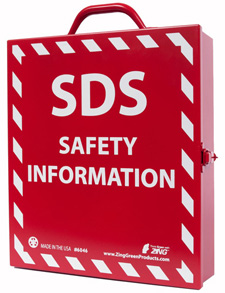



Find all of your laboratory and workplace safety supplies at Safety Emporium!
 Gangrene |
 Glossary Index |
 Gastroenteritis |
| MSDS Topics |
Free Sites | FAQ's | Regulations | Glossary | Software | Suppliers |
| Books | Forum | Poll | Fun stuff | Quiz | Store | |
| Understand your MSDS with the MS-Demystifier | Search ALL our MSDS info | |||||

Your employees can stay informed and comply with OSHA regulations with SDS information stations and compliance products from Safety Emporium.
You will sometimes see references to the "upper GI tract" or "lower GI symptoms".
The GI tract is part of the digestive tract, which is responsible for the digestion of food. The digestive tract includes additional components such as the liver, salivary glands, pancreas etc.
Your gastric juices (stomach acid) are very acidic, with a pH of 1 to 2.
On a Safety Data Sheet (SDS), the term gastric might be found in Section 11 (toxicological information) in reference to symptoms of ingestion of a toxic material (example, "symptoms include gastric distress, nausea and vomiting"). The term might also appear in reference to a treatment for ingested poison called gastric lavage which involves washing the stomach with large quantities of saline, followed by suctioning. This process is more commonly known as "pumping one's stomach".
The term "gastrointestinal" may appear on an SDS in reference to upper or lower GI symptoms. Upper GI symptoms might include nausea, stomach ache and reflux, while lower GI symptoms include diarrhea, constipation and rectal bleeding.
See also: catharsis, emesis, gastroenteritis, nausea, poison.
Additional definitions from Google and OneLook.
Entry last updated: Wednesday, December 28, 2022. This page is copyright 2000-2025 by ILPI. Unauthorized duplication or posting on other web sites is expressly prohibited. Send suggestions, comments, and new entry desires (include the URL if applicable) to us by email.
Disclaimer: The information contained herein is believed to be true and accurate, however ILPI makes no guarantees concerning the veracity of any statement. Use of any information on this page is at the reader's own risk. ILPI strongly encourages the reader to consult the appropriate local, state and federal agencies concerning the matters discussed herein.